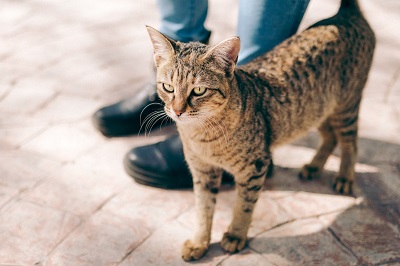That's Not a Fur Ball They're Hacking Up: 9 Ways to Tell if Your Cat is Sick
If your cat won't eat or is vomiting what it does it, you may have a sick cat on your hands. Keep reading to see all the signs.
If only we could talk with our cats. We'd tell them how much we love them, and they'd tell us when they're in the mood to play or get a belly rub. They'd also tell us when they were sick.
Unfortunately, our cats can't tell us when it's time for a visit to the vet. Luckily, there are several warnings signs to know when you've got a sick cat on your hands.

1. Strange Behavior
One of the easiest ways to tell your cat is sick is if they start hiding. Sick cats tend to hide away quietly when they're not feeling well.
Another way to tell your cat is in pain is if they get abnormally aggressive. You may accidentally touch a part of their body that's causing them pain. Take note of what you touched if your cat suddenly gets aggressive or violent.
If your cat frequently meows and purrs, but you notice that lately they've been very quiet, something might be up with their health. The same is true for quiet cats who start making noises out of nowhere.
2. A Change in Grooming Habits
You might notice that your cat's fur is looking a little greasy or matted. This is a sign that recently, they haven't been grooming themselves regularly. If your cat has stopped grooming altogether or is looking like they haven't groomed in a while, they might have a skin condition. It could potentially be related to a thyroid issue.
On the flip side, some cats will overdo it with grooming, ending up with balding patches of fur. This usually indicates the presence of some kind of parasite, like fleas. It could also be a behavioral response to stress.
3. Bad Breath
If your cat's breath is a bit unpleasant but not awful, a cleaning is probably in order. If their breath smells bad even after a cleaning, the smell might be a sign of gum disease or even an infection in the kidneys.
4. A Change in Energy
Don't assume that your cat is getting lazier lately because they're getting older.
If they don't jump from surfaces in your home anymore, or if they're not as frisky during play time, they might be undergoing joint pain. Keep an eye out for limping as well. This could indicate arthritis, which should be taken seriously.
Alternately, if your older cat's energy suddenly goes through the roof, this might be a sign of an overactive thyroid.
Also, pay attention to changes in their normal schedule. For example, if your cat used to be fairly active in the afternoons and now spends all day napping, they might be sick. The same is true if they're no longer sleeping through the night.
5. Frequent Hairballs
Check to be sure their hairballs are actually hair. If there's anything else in there, it counts as vomit. Excessive retching and vomit could be a sign of a heartworm or a digestive health problem.
If at any point you notice blood in their vomit, get them to the vet as soon as possible.
6. Litter Box Changes
As gross as it may be, pay attention to your cat's litter box habits. That way, you'll be able to respond quickly when you notice changes that might indicate a sick cat.
Is there blood in their urine? Are they urinating more often or seeming to struggle when they do? These might indicate a urinary tract infection.
Are they going to the bathroom elsewhere in the house, even though they've always been litter box trained? This could be a sign of a bladder infection or an issue with the kidneys.
Are their stools much more or much less frequent? Are they dealing with constipation or diarrhea? If either is going on for more than a couple of days, you should consult a vet.
7. Liquid-y Eyes and Nose
Discharge from your cat's eyes and/or nose is usually a sign of an upper respiratory infection. In other words, your cat caught a cold.
If the infection is bad enough, it'll make your cat feel so ill that they stop eating for a while. They can also pass it along to other pets in your home.
The best thing to do if their eyes and nose don't stop running is to see a vet, who might recommend medicine that'll make the cold go away sooner.
8. Ear Issues
Anything affecting a cat's ear is extremely uncomfortable for them.
Liquid discharge coming from their ear is usually a sign of an ear infection, but it could also be the result of a parasite. It's important to get this issue taken care of quickly, before the infection spreads to your cat's eardrum.
9. Abnormal Breathing
Abnormal breathing can include any of the following:
- faster breathing than usual
- wheezing sounds
- raspy breathing
- shortness of breath
If any of these things occur and don't go away after a couple of hours, seek immediate help. If the abnormal breathing starts and stops every now and then, schedule a visit to your vet.
How to Take Care of a Sick Cat
The best thing you can do for a sick cat is to take their signs of illness seriously. If you notice something slightly wrong and it doesn't go away on its own in a couple of days, play it safe and go the vet. If you notice one of the more serious signs of illness, go to the vet straight away.
Visit our website for more information on our veterinary services.












